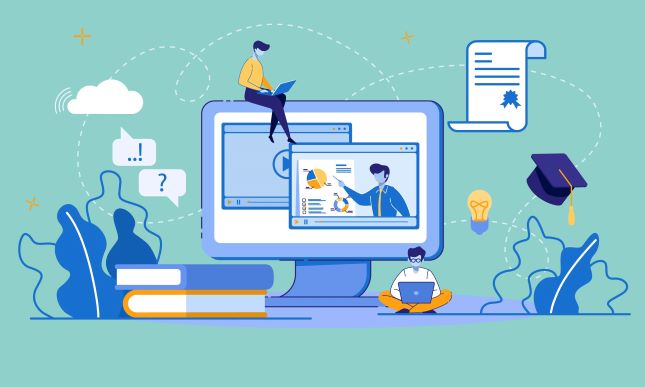Education Transformation
January 20, 2021 2023-05-03 13:39Education Transformation
Education Transformation: online schooling as a new standard in education
Abstract about Education Transformation
Education Transformation. This article addresses the transformation of education worldwide and the upwards trend of delivering online provision at the Primary and Secondary Levels. A brief history of online education pre and post-COVID-19 is outlined in this article, focusing on the framework and approaches undertaken by schools in the UK and abroad.
I will then discuss the advantages of The International British Online School’s (iBOS) chosen online virtual learning platform. Additionally, this article will compare online schools, like iBOS, with other online educational settings. In 2018 I interviewed 105 students and families who took part in the survey to supplement these findings. I will conclude by discussing the future benefits of online schooling and how it is the ultimate pathway for students’ future generations.
1. Introduction Education Transformation
In 1992 the World Wide Web (www.) was rolled out, enabling the accessibility and induction of online activity resulting in the early appearance of bespoke learning strategies and pedagogical models conducted on a computer. The lack of barriers and increasing user- friendliness of these virtual learning platforms were welcomed by students and educators globally, facilitating quality education to be delivered anywhere. With the ever-evolving expansion of technology, the rise in online learning platforms has grown exponentially.
While the concept of virtual education cemented itself in the 21st Century, the COVID- 19 pandemic altered every educator’s mindset, allowing online schooling to flourish. This article will briefly look at the history of online education, as it is worth highlighting that online provision has never prospered nor received the recognition it deserved until 2020. The timeline of online education has confronted tough questions over the years.
There was a lot of speculation in the media questioning the quality of education provided in conventional schools, and concerns were expressed surrounding the rise of inadequately trained staff. Therefore, various models have materialised to understand how new online learning techniques can be useful, engaging, and relevant, to combat these concerns. Subsequently, a new revolution took place with the implementation of virtual learning by local governments, thus opening educators’ eyes to the advantages associated with this new mode of teaching.
A mixture of online school approaches has arisen alongside varied responses from parents and students. This has resulted in establishing new modes of lesson delivery, learning domains, learning principles, assessment strategies, and notably new educational roles and responsibilities.
2. Different methods of educational settings
Over the past year, we have seen conventional schools adapting their delivery methods to cater for home learning. This includes the increased use and expansion of school virtual learning environments to incorporate both in-person and live online lessons.
Assuring top- quality teaching remained a challenge, due to the forced, and often rushed uptake of alternative online teaching strategies, resulting in poor outcomes, and a major global crisis regarding assessment results and accurate predictions. Many national governments had to review their grading thresholds and assessment strategies, leaving students in a state of confusion and uncertainty.
read more: iBOS top tips for online education apps
On the other hand, we have seen a rise in bespoke online educational settings and schools, like iBOS, where all lessons are taught online as the primary teaching medium for the entire course. iBOS benefits from a state-of-the-art online platform enabling a) teachers to deliver outstanding, uninterrupted lessons b) a constant assessment of student learning, and c) student progress updates relayed to parents weekly.
Live lessons incorporate activities, class discussions, and presentations, complemented by additional media outlets. Intuitive and effective peer assessment and AfL strategies are always incorporated in our live lessons and have proven to be a more effective teaching strategy due to reduced classroom distractions.
At iBOS, we have seen higher levels of individual progress than those in conventional school settings. Our data suggest that students experience around 30% more learning per lesson in an online environment; Arguably, this directly maximises student learning time eliminating the factors that often hinder learning efficiency.
3. History of Online Teaching
The use of computers for delivering lessons has grown significantly since the rollout of the internet. Universities and training providers were first to begin experimenting with computer led education for their undergraduate courses; for example, The Virtual Classroom project launched by Roxanne Hiltz in the late 1980s.
This project proved that in subjects such as Sociology, Computer Science, Management, and Statistics, students learned more online however, their exam results hardly fluctuated (Hiltz, 1994). Due to the application of scientific quasi-experimental design processes that yielded robust quantitative evidence, I believe this project significantly benefited online education development.
Since then, a lot has taken place, and with the rapid improvement and acceptance of technology by authorities, course providers, and accredited educational bodies, we have seen some incredible achievements over the years. The elimination of conventional school distractions and tailored approaches is the primary catalyst of such significant learning achievements that we have seen at iBOS.

4. Online Schooling pre and post COVID-19
Whilst many online school providers started from the early 2000s, online education was never acknowledged and accepted widely by parents and students, as those providers solely targeted students who had fallen through the net or had long term medical conditions. The impact of COVID-19 changed everyone’s minds, as schools were forced to deliver education remotely with the unequipped systems and resources.
This, of course, was incredibly difficult, as schools were not ready to deliver their curriculum online, they lacked coherent strategies around assessments, and consequently failed to provide accurate, tangible data at the end of the academic year. This is where the research iBOS leaders conducted in 2017 to determine student and parent viewpoints towards online education is relevant. The research revealed a series of concerns and challenges students faced in conventional schools worldwide.
The common theme was the inadequate teaching and learning quality alongside inefficient strategies to deal with challenging student behaviours. Additionally, parents expressed concerns about costs associated with British private schools and the low progress rates and outcomes in local state schools.
why ibos?
iBOS was established in 2019 by a group of senior education leaders with decades of experience in leading schools between them. The school’s main vision has been to provide top-quality education to students globally alongside being inclusive of all abilities. A five-year projection plan was put together as part of the school’s development plan, and we have three phases to meet to become a thriving all through school by 2025.
As conventional schools were forced to shut abruptly, students learning was hindered, and home-schooling became every parents’ worst nightmare. Since then, we have seen a rise of new educational online educational providers that offer tuition at a small cost.
However, they often fail to meet quality assurance standards and face safeguarding crises. Unlike them, iBOS benefits from a solidified bespoke virtual learning platform coupled with expert online teachers who have adapted their practice of delivering lessons in person and transferred this knowledge to an online setting. This allows us to stand out as an established, legitimate online school that caters to our students’ needs.
5. The importance of correct virtual learning platforms
Discourse is a fundamental aspect of learning. “Learning is enhanced by articulation, abstraction, and commitment on the part of the learner: instructions should provide opportunities for learners to articulate their newly acquired knowledge” (Koschmann, Myers, Feltovich, & Barrows, 1994).
We know that articulation is a cognitive act in which the student presents, defends, develops, and refines their ideas. As we have found out at iBOS, enabling, and enhancing this through a virtual learning platform is even more significant in student progression and development, resultingly improving the teacher-student relationship.
To become a successful online school, one must have many key foundations to thrive. I would certainly agree that having an appropriate platform to deliver lessons coherently is essential to enhancing students’ cognitive development, alongside a high quality of teaching and learning.
read more: What are the best Universities in the UK?
Additionally, online teaching requires a series of standardised strategies and resources for it to be successful; it requires an in-depth understanding of the students’ needs and ability. At iBOS, we have invested a lot in researching the best live video linking applications to students’ virtual learning platforms.
We know our state-of-the-art system meets our students, parents, and teachers’ requirement that allow lessons to be delivered coherently. Without the right technology and online facilities, we would have struggled to meet our teaching and learning goals.
Whilst many schools lack the required funding to research and implement substantive strategies to deliver lessons remotely, our technology has geared students to be active learners, improving their cognitive growth and developing problem-solving skills. Keep an eye out for upcoming articles detailing further our best IT tips.
Conclusion
The emergence of virtual learning environments and online education has highlighted that we, as educators need a better understanding of delivering effective and dynamic learning that students are consistently engaged with. Brown (1990) viewed new educational environments as part of “the shift from seeing technology as a cognitive delivery system, to seeing it as a means of supporting collaborative learning”.
My conclusions:
• Online education now seems to be many students’ mode of study.
• The uptake of accredited online schools is growing exponentially.
• Our teachers report that teaching online reinvigorated their enthusiasm for teaching, as they feel more intellectually stimulated and motivated due to higher student engagement and a heightened sense of community.
• We have seen significantly better progress than in-person lessons. In our opinion, students produce better written and more reflective classwork.
• We know that students prefer the enhanced interaction and educational quality that an online school offers. They appreciate the increased control over their time and peer interaction.
• Our students’ major problem surrounds technical difficulties and slow internet connections, instead of the quality of teaching and learning.
• We have learnt that it is significant for students and their families to do in-depth research into ensuring the right establishment is chosen to suit the individual child’s ability.
• It is essential to differentiate between tuition centres and actual online schools. The majority of new start-up schools outsource their teaching to individuals worldwide, minimising their costs in the long run but does not deliver the high level of teaching and collaboration an established Department of Education school should. Whereas iBOS, with one school hub in London, allows sharing teaching strategies and improved team collaboration.
• At iBOS, we put students at the heart of everything. As educators, middle, and senior leaders, we are in this profession to nurture students for them to achieve their utmost potential, academically and vocationally. We believe online education is the future, and we aim to be the pioneering online primary and secondary school, achieving the highest possible outcomes from our students.
References
Brown, A.L. (1990). Domain-specific principles affect learning and transfer in children. Cognitive
Science, 14 (1), 107-133
Koschmann, T., Myers, A., Feltovich, P., & Barrows, H. (1994). Using technology to assist in realising
effective learning and instructions: a principled approach to the use of computers in collaborative
learning. Journal of the Learning Sciences, 3 (3), 227-26





